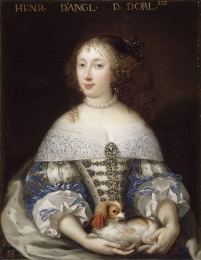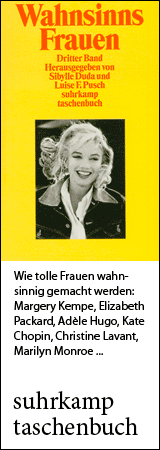Biographies Henriette Anne d’Angleterre

Commons.Wikimedia.org
born on June 16, 1644 in Exeter, England
died on June 30, 1670 in Saint Cloud, France
French duchess and diplomat, sister of Charles II of England
355th anniversary of her death on June 30, 2025
Biography
Henriette Anne d’Angleterre, also known as Henrietta of England, was a member of the royal house of the ill-fated Stuarts. Two weeks after her birth, she and her mother had to be brought to safety in France. Her father was executed in London in 1649.
Henriette Anne grew up at her mother's impoverished court near Paris. There were constant quarrels between her mother and her eldest brother Charles. Henriette Anne had the only lasting emotional relationship of her life with Charles who, although otherwise not inclined to harbor intense feelings for any woman, loved his sister deeply and absolutely.
As the sister of an exiled king who didn't even have enough money for his own upkeep, Henriette Anne's future appeared bleak. She was very attractive: although she had a small hump, her contemporaries described her as charming, witty, beautiful and virtuous.
“Never fear that someone in my entourage might gain power over you; for believe me, no one will infringe on the love I have for you.” (Charles II of England to his sister Henriette Anne)
Charles's triumphant return to England in 1660 did make his sister a desirable match after all. She was married to Philip of Orléans, the brother of the French King Louis XIV and a homosexual who took his revenge for the marriage by repeatedly impregnating his unwanted wife. She was pregnant eight times in nine years – but only two daughters survived. She consoled herself with lesbian relationships. She was publicly humiliated by her husband, and his lover, the Chevalier de Lorraine, treated her with contempt. This did not change until Louis XIV, needing to use her influence over the English king, had the Chevalier de Lorraine removed from court.
In line with Louis's wishes, Henriette Anne traveled to England in 1670 and successfully negotiated the Secret Treaty of Dover with her brother.
She returned home conscious of her foreign policy success. A few days later she was dead, presumably poisoned.
Her husband remained strangely unmoved and barely waited for her to die before summoning his lover back to court. In her final hours, Henriette Anne’s thoughts were mainly of her brother:
“Ah! how I grieve for my brother, the king. He is losing the person who loves him most in this world.”
(Text from 1993; translated with DeepL.com; edited by Ramona Fararo, 2025.
Please consult the German version for additional information, pictures, sources, videos, and bibliography.)
Author: Marianne Goch
If you hold the rights to one or more of the images on this page and object to its/their appearance here, please contact Fembio.



